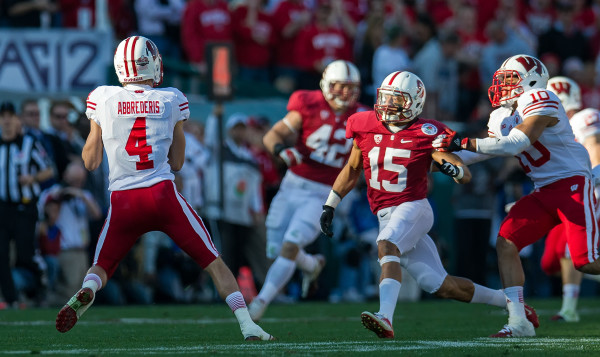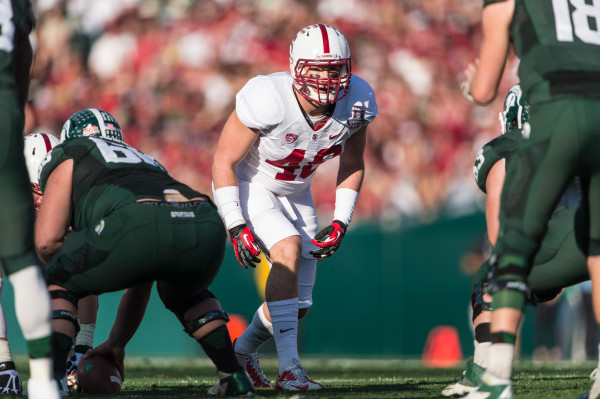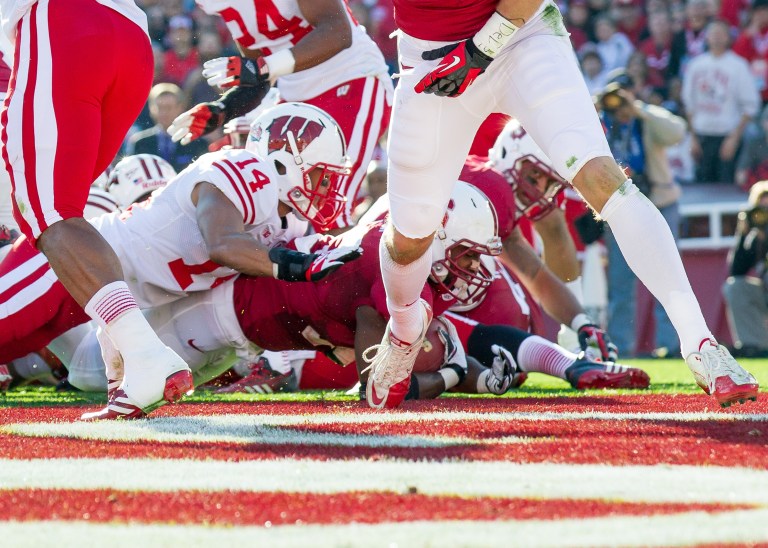On New Year’s Day, No. 5 Stanford (11-2) will take the field for the last time this season against the No. 6 University of Iowa (12-1) in Pasadena, California for what will be the Cardinal’s 15th Rose Bowl berth.
The Hawkeyes’ last Rose Bowl appearance came in 1991, whereas The Granddaddy of Them All is no stranger to this Cardinal team, as this will mark the program’s third Rose Bowl trip in the last four years. Here’s a look at Stanford’s last three trips to the Rose Bowl:
2000: Stanford vs. Wisconsin
The 2000 Rose Bowl was Stanford’s (8-3) first Rose Bowl appearance since 1972. The matchup against two-time Big Ten Champion Wisconsin (9-2) featured a powerful Badger run game lead by 1999 Heisman Trophy winner and running back Ron Dayne. The senior rushed for 200 yards, leading Wisconsin to its second consecutive Rose Bowl victory and earning player of the game honors.
After a scoreless first quarter, Stanford kicked a 28-yard field goal to put the first points on the board. Just over four minutes later, Wisconsin tied it up with a 31-yard field goal of its own. With 2:03 left in the half, Stanford’s Kerry Carter ran the ball in from the 1-yard line for a touchdown, but a failed two-point conversion left the score at 9-3.
Stanford couldn’t keep its offensive momentum going in the second half and was held scoreless for the remaining 30 minutes of play. After a 64-yard run and 4-yard touchdown run by Dayne, the Badgers took the lead for the first time with 12:57 left in the third quarter. A bad snap on a Stanford field goal attempt resulted in a blocked kick and shortly after, sophomore quarterback Brooks Bollinger ran for a Badgers touchdown, topping off Wisconsin’s 17-9 victory.
2013: Stanford vs. Wisconsin

No. 8 Stanford (11-2) entered the Rose Bowl 13 years later as the favorite over the unranked Big Ten Champion Wisconsin Badgers (for a second straight time). Wisconsin’s unimpressive 8-5 record would not have even qualified the team for the Big Ten title game had not both Penn State and Ohio State been ineligible. To make matters worse for the Badgers, their head coach, Bret Bielema, accepted the head coaching position at Arkansas shortly before the game. Hall of Fame and former Wisconsin coach Barry Alvarez returned to serve as the interim coach for the Badgers after retiring from the head coach job seven years earlier.
Despite Wisconsin’s mediocre record and unfamiliar head coach, the game developed into a serious defensive battle. The Badgers limited sophomore quarterback Kevin Hogan to 123 passing yards and senior running back Stepfan Taylor rushed for only 89 yards, almost 22 yards less than his average. But it was the Stanford defense that was the star of the show, as it completely shut down the Badgers’ offense in the second half.
The Cardinal held Wisconsin scoreless in the first quarter, allowing the Stanford offense to gain an early 14-point lead. On Stanford’s opening drive, sophomore Kelsey Young ran into the end zone with a 16-yard carry and Taylor scored again for the Cardinal with 6:35 left in the quarter.
Wisconsin put its first points on the board when senior running back Montee Ball ran in a touchdown with 9:05 left in the half. After a Stanford field goal, Wisconsin responded again with an 85-yard touchdown drive, featuring a 38-yard run from sixth-year senior quarterback Curt Phillips, cutting Stanford’s halftime lead to 17-14.
In the second half, the Stanford defense shut down the Badgers’ offense, as they were unable to score and were limited to only four first downs. Stanford kicker Jordan Williamson put another three points on the board after a 22-yard field goal with only 4:23 left in the game.
Needing just a touchdown and extra point to win the game, Wisconsin marched down the field on its final drive. However, with 2:03 left to play, the team’s chance at a comeback victory was snapped when Stanford nickelback Usua Amanam made the game-winning interception on the Cardinal’s 42-yard line, earning Amanam co-MVP honors alongside Stepfan Taylor. This win not only brought the Cardinal its first Rose Bowl victory in four decades but also its 12th victory of the season for the second time in school history.
2014: Stanford vs. Michigan State

For one quarter of play of Stanford’s (11-2) second consecutive Rose Bowl appearance, it looked as if the hyped Michigan State (13-1) team would be an easy matchup for the Cardinal. On just the second play of the game, Hogan opened with a huge 43-yard pass to sophomore wide receiver Michael Rector. A few plays later, senior running back Tyler Gaffney scored on a 16-yard run.
The Stanford defense stopped the Spartans on their first two drives and a 47-yard run by Gaffney put the Cardinal in field goal position, bringing to score to 10-0 at the end of the first quarter.
But the Spartans were not going to roll over in their first Rose Bowl appearance since 1988, and Michigan State would ultimately suffocate the Stanford offense. A third-and-goal pass interference call against the Cardinal on the Stanford 9-yard line set up junior running back Jeremy Langford to complete a 75-yard touchdown drive, narrowing Stanford’s lead to 10-7.
With 2:07 left in the first half, Stanford linebacker Kevin Anderson intercepted a pass, returning the ball 40-yards for a pick-six, reestablishing the Cardinal’s 10-point lead. Michigan State came back with vengeance, and after 24, 11 and 37-yard passes put the Spartans on the Stanford 3-yard line, Cook threw a touchdown pass to sophomore fullback Trevor Pendleton leaving the score 17-14 at half.
On the opening drive of the second half, Michigan State tied up the game with a 31-yard field goal. While the Spartans were gaining momentum, the Stanford offense was stalling, and a turnover and failed fourth-down conversion left the Cardinal scoreless in the third quarter.
After a poorly executed punt, Michigan State started its first drive of the fourth quarter on the Cardinal’s 27-yard line. Three plays later, Connor Cook connected with junior wide receiver Tony Lippett in the end zone for 25-yard touchdown pass, putting the Spartans up for the first time, 24-17.
A 39-yard field goal with 4:15 left in the game put the Cardinal within four, but with go-to receiver Ty Montgomery out on a knee injury, the win was made nearly impossible. When the Cardinal got the ball back with 3:06 left in the game, they couldn’t manage a first down. The Spartans sealed their victory when they stuffed fifth-year senior fullback Ryan Hewitt for no gain on fourth-and-1.
Contact Laura Stickells at lauraczs ‘at’ stanford.edu.
